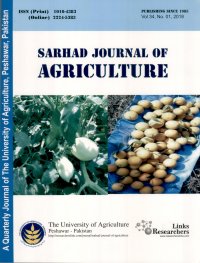Self-perceived Constraints of Extension Field Staff Affecting their Working Efficiency in Khyber Pakhtunkhwa, Pakistan
Syed Muhammad1*, Badar Naseem Siddiqui2, Farhat Ullah Khan1 and Nawab Khan3
ABSTRACT
The responsibility of Extension Field Staff (EFS) is the dissemination of latest agricultural technologies to educate the farmers’ community about how to use new applications and techniques of modern technology for the purpose to increase agricultural production. The efficiency of EFS is, therefore, reflected by the farmers’ adoption level of modern recommended technology. The current study was designed and conducted during February 2018 for the purpose to find out self-perceived main constraints, affecting the efficiency of EFS in the province of Khyber Pakhtunkhwa, Pakistan. Five districts out of 26 were randomly selected one each from eastern, western, northern, southern, and central districts of the province. At second stage, two tehsils were randomly selected from each selected district for data collection. Data was collected personally through validated and pre-tested questionnaire from all the selected ten tehsils of the selected districts in which all EFS (95) respondents comprised of Field Assistants (FAs) and Agriculture Officers (AOs) served as respondents. Five-point Likert scale (Likert 1967) was used to record the response of respondents. Results showed that a majority of the respondents (85.3 %) were FAs by designation, almost half of them (50.5 %) were of middle age (> 35 to 50 years), majority (48.4 %) had education up to SSC with Diploma in agriculture, majority (81.1 %) were of rural background, and all had received trainings of different duration. Important constraints which affected the efficiency of EFS were lack of transport, political interference in transfers, large jurisdiction area, non-participation in policy decisions, unsatisfactory pay structure, unavailability of medical facilities, low opportunity of proper in-service trainings, poor linkages of agricultural extension with research wing and low social status. The Department of Agricultural Extension, Khyber Pakhtunkhwa, is advised to adopt appropriate measures to address these constraints of EFS in order to enable them to efficiently deliver their services.
To share on other social networks, click on any share button. What are these?







